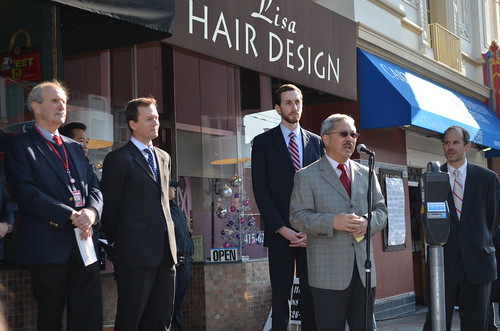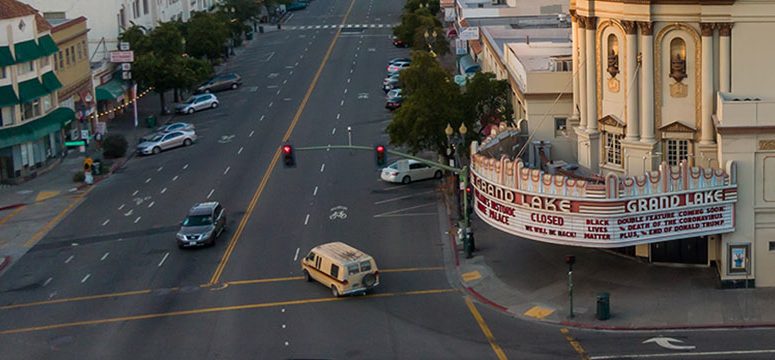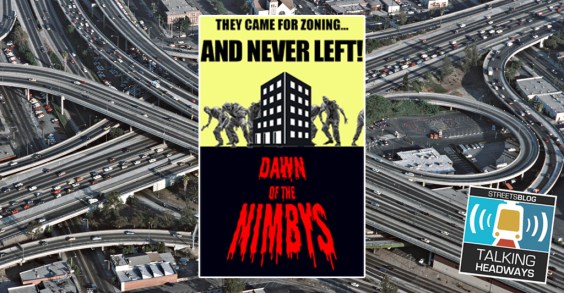San Francisco was one of two cities this week to receive the Institute for Transportation and Development's prestigious 2012 Sustainable Transport Award. No doubt, the ITDP award was well-deserved for the SFMTA's successful implementation of the groundbreaking SFPark program, as well as the SF Planning Department's proliferation of parklets under its Pavement to Parks program. Those efforts have grabbed attention around the world.
But whether San Francisco will live up to its promise as a leader in sustainable transportation in the coming years depends on the political will of city leaders like Mayor Ed Lee and SFMTA Director Ed Reiskin to make bold improvements to our streets. Lasting change will come from policies like extending parking meter hours, consolidating bus stops, implementing a strong pedestrian safety action plan, and the swift build-out of safer, more comfortable bikeways to increase bicycle ridership.
"San Francisco has indeed never been so poised to leap ahead and build on the successes of the past few years by committing to and vigorously pursuing a sound strategy that will get the city to its goal of 20 percent of trips by bicycle by 2020," said San Francisco Bicycle Coalition (SFBC) Deputy Director Kit Hodge. "San Francisco loves bicycling and is more ready than ever to take even bigger steps forward, beginning right now with the implementation of the crosstown bike routes in our Connecting the City vision."
This month, the SFMTA approved its 2013 - 2018 Strategic Plan [PDF], setting out to reduce car use from 62 percent of all trips to 50 percent. And San Francisco's goal of reaching 20 percent trips by bike by 2020 is uniquely ambitious among American cities. But for the reality to match the rhetoric, change will have to happen faster.
To use the example of bikeways and complete streets, the agency's current rate of delivery on protected bike lanes doesn't seem sufficient to meet the city's targets. The SFMTA has struggled so far to keep up with the bold ten-year plan envisioned by the SFBC in its Connecting the City campaign, which calls for 100 miles of bikeways by 2020. The city's first parking-protected bikeway is only expected to begin construction this week after a year of delay, and fixing the crucial bicycling link on just three blocks of Fell and Oak Streets will have taken over a year and a half from conception to implementation. Planners on that project have said the time required is partly due to the search for new car parking spots to make up for the spaces the bikeways will replace.
Meanwhile, New York City has built about twenty miles of protected bikeways in recent years, and aims to build up to ten more in Manhattan by 2013. Traffic injuries to all users have dropped as much as 35 percent on streets with protected bikeways, and the reallocation of space from traffic to pedestrians in Midtown has produced even more impressive safety gains. Overall, the city's pedestrian fatalities have declined by 40 percent since 2001. In Chicago, Mayor Rahm Emanuel quickly installed the Kinzie Street bikeway last summer, and wants to build 100 miles -- the same number envisioned by SFBC within the decade -- before his first term is over.
San Francisco's SFPark program, while highly successful, could extend to more neighborhoods and cover additional times of day when it is sorely needed. The program is perhaps the most visibly noted accomplishment by the ITDP, but it is being tested by a backlash as the SFMTA seeks to expand it into the neighborhoods around Mission Bay. Whether neighbors have valid criticisms of the agency's outreach or they just don't want to pay for parking, SFPark manager Jay Primus announced this week that the agency will postpone taking the expansion plan before the SFMTA Board of Directors. Meanwhile, Mayor Lee has backed down on extending meter hours that would allow SFPark to be used most effectively. Eyes are on city leaders and staff to see how willing they are to stay the course with a groundbreaking, progressive and effective program.
San Francisco has made some important advances in sustainable transportation. But to meet -- and perhaps exceed -- the expectations set by the ITDP's award, Mayor Lee and other leaders must commit to the changes San Francisco needs to achieve safer, more livable streets.






